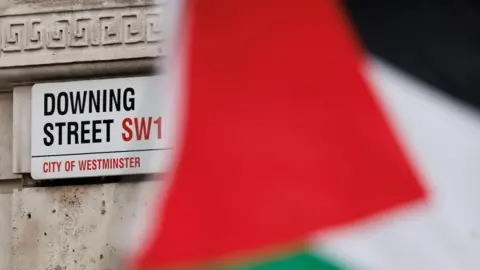Chief Political Correspondent
 Getty Images
Getty ImagesSir Keir Starmer is familiar with Emily Damari’s ordeal.
Over the 15 months that she was held hostage in Gaza, the prime minister mentioned her several times when talking about the war, including describing phone calls he held with her British mother Mandy when she did not know whether Emily was still alive.
So it will no doubt feel unpleasant, to say the least, for the prime minister to find himself on the receiving end of sharp criticism from Emily today.
Responding to Sir Keir’s announcement that he was willing to recognise a Palestinian state in September, Ms Damari accused him of “moral failure”.
She said he risked “rewarding terror” and “prolonging the conflict”.
Her intervention echoed a statement from representatives of 10 hostages who are being held or have been held in Gaza, who are either British or have close ties to Britain.
They said that they took no position on the “wider politics” of the war, but they were concerned that the UK’s new position would remove incentives for Hamas to sign up to a ceasefire and release the remaining hostages, because it could now make recognition of a Palestinian state less likely.
The concern of the hostage families is based on one of the prevailing interpretations of what the prime minister said in Downing Street after Tuesday’s emergency cabinet meeting.
Namely, that UK recognition of Palestine would be determined only by whether Israel met various conditions in the intervening weeks: agreeing to a ceasefire, making it clear it will not annex the West Bank, taking “substantive steps” to end the humanitarian crisis in Gaza, and committing to a long-term peace process.
Yet government sources today have been pointing additionally to another element of the prime minister’s statement on Tuesday.
“Our message to the terrorists of Hamas is unchanged and unequivocal,” he said. “They must immediately release all the hostages, sign up to a ceasefire, disarm and accept that they will play no part in the government of Gaza.
“We will make an assessment in September on how far the parties have met these steps.”
Parties plural – that’s to say, both Israel and Hamas.
This, Downing Street sources argue, shows that the question of whether the UK ultimately presses ahead with recognition will be based not solely on Israel’s actions but those of Hamas too, and means that their approach will not disincentivise Hamas to release the hostages after all.
 Getty Images
Getty ImagesBut that position has not been consistently articulated.
For example, speaking to the BBC today, Transport Secretary Heidi Alexander said that “the ball is in the Israeli government’s court”.
Asked whether recognition would still happen if Hamas is in control of Gaza in September, she replied by speaking only about the need for Israel to meet the government’s conditions.
The bottom line is this: nobody I have spoken to in Labour expects the government to do anything other than recognise Palestine in September.
For all the uncertainty about the precise conditions for getting there, and the mechanics of the assessment process the government will carry out, that is the significance of what Sir Keir said on Tuesday.
And that is a hugely significant shift in the UK’s diplomatic posture, both across governments of different stripes, and compared to what this government was saying just a few days ago.
Sir Keir has long said that he wants to recognise a Palestinian state, but only when it would make the biggest contribution to bringing about a two-state solution – which, it had generally been assumed, meant after the end of this war.
The delicate politics involved in changing position is one reason why the government has ended up in a slightly convoluted position today.
Politics was also undoubtedly involved in the government’s decision to change course.
Political gravity
Sir Keir’s own rhetoric, especially as regards the humanitarian situation in Gaza, has been publicly hardening for a little while.
But the mood of the parliamentary Labour party was moving faster.
By the start of this week, more than half of Labour’s MPs who don’t hold government positions had signed a letter urging the government to recognise Palestine.
Cabinet ministers were finding ways to let it be known that they agreed too.
Among some in government, there was concern that when MPs return from their summer break in September, an opposition party would find a way to force a vote on the issue – and Starmer would have to climb down then, if he had not done so beforehand.
Political gravity was always going to take effect before long. There is a risk, though, that the government could fall between two stools.
There are those, including some of those in Labour who have been pushing to recognise Palestine most loudly, who argue that if Palestinian statehood is the inalienable right of the Palestinian people, then it should not be conditional on actions taken by the Israeli government.
That is also the position taken by the Liberal Democrats, the Green Party, and independents such as Jeremy Corbyn.
On the other side, there are those who argue that this is gesture politics, and statehood should not be entertained until Hamas has released the hostages – even though ultimately the Palestinian state the UK envisages would be governed by the Palestinian Authority, not Hamas.
That’s the position of a few in Labour, though more prominently of the Conservatives and Reform UK.
Ultimately, above all, a change in the government’s position became inevitable because the middle of the Labour Party – those who have not necessarily always been vocal on this issue, and have generally backed Sir Keir’s judgment – wanted a change. They are happy today.
That fragile political peace is based on a universal assumption that this is all merely a staging post to inevitable recognition of Palestine in just a few weeks.




